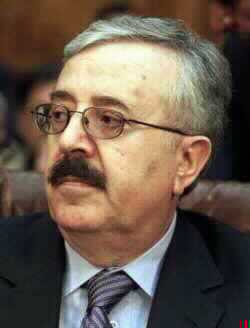Iraq's parliament convenes in an emergency session on Monday to decide on a tough new U.N. resolution calling on Baghdad to disarm or face possible military action. Iraq has until November 15 to agree to a Security Council resolution passed unanimously on Friday demanding that Baghdad allows U.N. arms experts unhindered access to sites suspected of producing weapons of mass destruction or face "serious consequences."
The United States warned Iraq on Sunday one false step in complying with the resolution would result in military action.
The U.S. military said American and British warplanes bombed anti-aircraft missile sites on Sunday in the "no-fly zone" enforced by Washington and London in southern Iraq -- the first such action since the Friday resolution was passed.
The U.S. Central Command said the attacking aircraft used precision-guided weapons against two surface-to-air missile sites about 175 miles southeast of Baghdad. There was no immediate Iraqi comment.
"Parliament will take the necessary decision regarding the U.N. Security Council resolution," one source said.
Top weapons inspectors are due to travel to Iraq on November 18 to set up communications, transport and laboratories.
Signaling hopes for a breakthrough, Egyptian Foreign Minister Ahmed Maher said after an extraordinary meeting of Arab foreign ministers in Cairo on Sunday that Baghdad appeared inclined toward accepting the new text.
"The indications are positive and there was a general feeling during the meeting that the cooperation of Iraq with the inspectors will be instrumental in avoiding any military operation," he said when asked about Iraq's likely response.
Asked if ministers had called on Iraq to agree to the U.N. terms, Maher told reporters: "The Iraqi tendency is positive in general. That's why there was no need to make such a call."
"ZERO TOLERANCE" FOR IRAQ
In Washington, U.S. national security adviser Condoleezza Rice said Iraq would be held to a "zero tolerance" standard on arms inspections under the new resolution. Any breach would trigger serious consequences, she told Fox News Sunday.
Disarmament inspections first started after Iraqi forces were expelled from neighboring Kuwait by a U.S.-led coalition in the 1991 Gulf War. Inspectors withdrew in 1998 in a wrangle over access to Saddam's palaces.
Rice said Bush reserved the right to use force without Security Council approval if Iraq violated the resolution. But Washington would initially discuss with the Council the consequences of any breach.
U.S. officials said President Bush had approved plans for the invasion of Iraq if it failed to comply fully with the resolution.
The plan, based on the lessons learned during the Afghan conflict, calls for the quick capture of Iraqi territory to establish forward bases that would be used to propel 200,000 or more troops deeper into the country.
Saddam on Sunday ordered the Iraqi parliament to hold an emergency meeting on the new resolution. The parliament will then refer its decision to Iraq's highest leadership authority -- the so-called Revolutionary Command Council led by Saddam and chaired by his top aides.
The 250-seat Iraqi parliament will hold closed-door consultations on Monday morning ahead of the plenary session in the evening, another parliamentary source said.
Arab foreign ministers on Sunday endorsed the toughly worded resolution but also called on Security Council members to ensure it could not be used as an automatic trigger for war.
The resolution gives inspectors sweeping new rights and Iraq 30 days to submit a detailed list of its weapons. It also gives the Security Council a key role before any possible attack, but does not force Washington to seek authorization for war.
Chief U.N. weapons inspector Hans Blix is due in Cyprus this week where his team will have a base, before heading for Iraq, a Cyprus government source said.
An advance team of about a dozen inspectors is expected to head for Baghdad around November 25 to make spot inspections. Between 80 and 100 inspectors are due to resume their work in full by December 23.
PHOTO CAPTION
Iraq's Foreign Minister Naji Sabri looks on before the start of an Arab League Arab Foreign Ministers meeting at the Cairo-based league headquarters November 10, 2002. The Iraqi parliament will convene in emergency session on Nov. 11 to decide on a U.N. resolution to disarm Iraq, and Egypt said Baghdad's position on the new text was positive. (Aladin Abdel Naby/Reuters)
- Author:
& News Agencies - Section:
WORLD HEADLINES


 Home
Home Discover Islam
Discover Islam Quran Recitations
Quran Recitations Lectures
Lectures
 Fatwa
Fatwa Articles
Articles Fiqh
Fiqh E-Books
E-Books Boys & Girls
Boys & Girls  Women
Women










